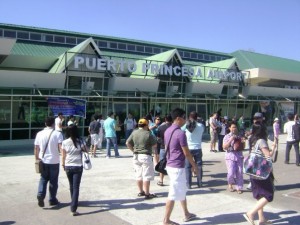DOTC woos UK investors for PPP deals

Puerto Princesa airport is one of six provincial airport deals that will be ready for rollout in the fourth quarter of 2014 under the public-private partnership program. The Department of Transportation and Communications made a pitch to British investors and trade officials Thursday as it seeks to drum up interests for upcoming infrastructure deals under the administration’s PPP program.
MANILA, Philippines—The Department of Transportation and Communications made a pitch to British investors and trade officials Thursday as it seeks to drum up interests for upcoming infrastructure deals under the administration’s public-private partnership program.
Transportation Undersecretary Rene Limcaoco made the presentation in Manila as President Aquino was in Europe on an official visit, partly to promote about $20 billion worth of PPP deals still in the pipeline.
Part of the department’s own pipeline on Thursday involved big-ticket airport and railway deals, as the department seeks to address an infrastructure gap needed to support the current pace of economic growth.
The DOTC, for example, said that about P109.6 billion would be invested in various airport projects across the Philippines, partly to attract more tourists, Limacaoco said.
“We need interested bidders. To enthuse interested companies to bid, we commit to a fair, transparent and level playing field,” Limcaoco told participants during the UK Transport Solutions forum on Thursday.
Article continues after this advertisementIn terms of PPPs, the government was seeking final approval for at least six provincial airport deals, or those in Laguindingan, Bohol, Puerto Princesa, Iloilo, Bacolod and Davao. Limcaoco said these would be ready for rollout in the fourth quarter of 2014.
Article continues after this advertisementThe government was confident in airport PPPs, after drawing strong interest for the P17.5-billion Mactan Cebu International Airport deal, which was won by the consortium of Megawide Construction Corp. and India’s GMR Infrastructure last April.
“We want to expand Philippine tourism. Tourism is a low-hanging fruit that will sop up excess underemployment that the Philippine economy also has,” Limcaoco said.
Big-ticket railway deals also include the operations and maintenance of Light Rail Transit Line 2, the $1.5 billion North-South Commuter rail line, a $3 billion mass transit system loop and the LRT-1 Dasmariñas extension.
Limcaoco said the existing railways serving Metro Manila account for only 6 percent of trips today but the figure is seen to increase to 17 percent to 18 percent after new and expansion railway projects are built.
“In the Philippine transportation sector, the biggest challenges include the need to fill the infrastructure gap and deliver services to ensure mobility in a fast growing country,” Transportation Undersecretary Jose Perpetuo Lotilla said in a prepared speech.